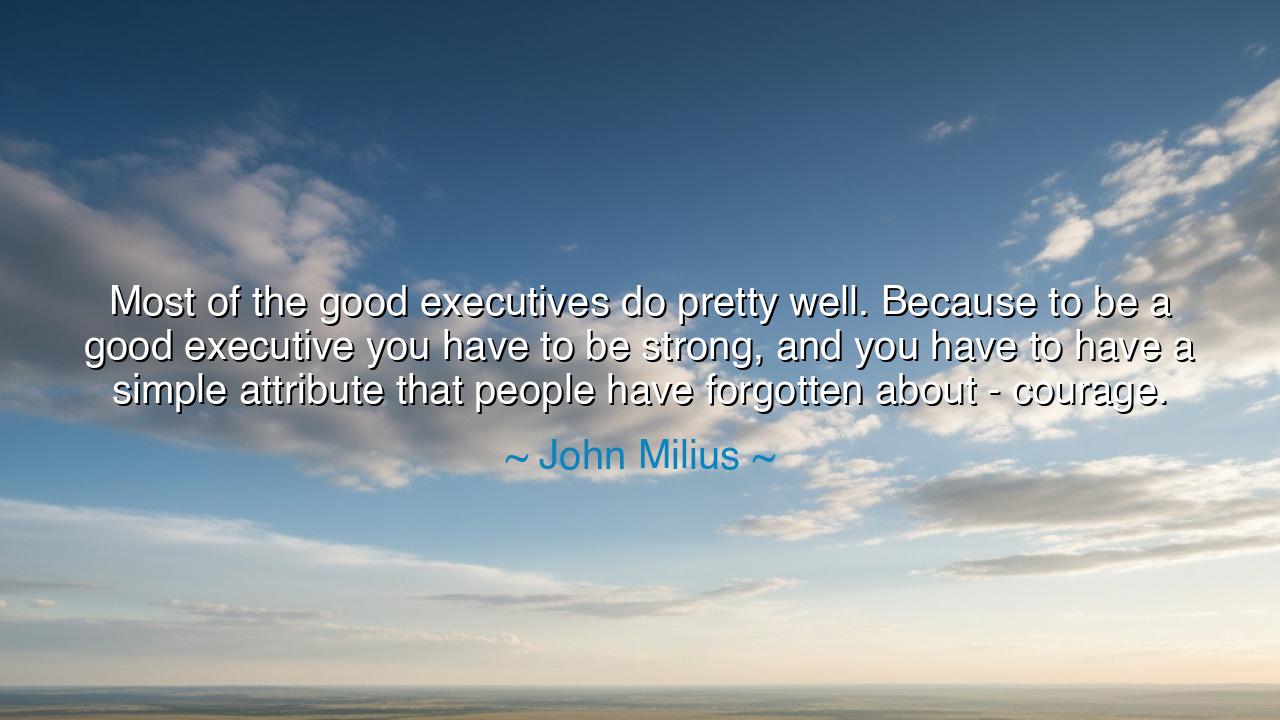
Most of the good executives do pretty well. Because to be a good
Most of the good executives do pretty well. Because to be a good executive you have to be strong, and you have to have a simple attribute that people have forgotten about - courage.






“Most of the good executives do pretty well. Because to be a good executive you have to be strong, and you have to have a simple attribute that people have forgotten about — courage.”
Thus spoke John Milius, the maverick filmmaker, screenwriter, and warrior-poet of American cinema — a man who understood that leadership, whether in art, war, or business, is not born of comfort but of strength and courage. In this brief yet powerful statement, Milius reveals a truth older than empires: that the essence of leadership lies not in calculation, not in strategy alone, but in the will to act when the moment demands it. For in every age, the world has been steered not by the timid and compliant, but by those who dared — those who possessed the courage to decide, to risk, and to stand alone when others wavered.
To understand the origin of this quote, one must understand Milius himself — a man who lived and breathed the archetype of the warrior storyteller. Known for writing Apocalypse Now and Conan the Barbarian, he admired the spirit of those who could face chaos with clarity and purpose. When he spoke of “good executives,” he meant not merely corporate leaders, but all those who must command — those responsible for vision, for others, for the course of things greater than themselves. His words were born of observation: that too many seek safety in consensus, hiding behind committees and policies, while true leadership demands the solitary strength to say, “I will take the risk. I will bear the outcome.”
Courage, as Milius reminds us, is a simple attribute — yet simplicity is often the hardest virtue to practice. The ancients called it andreia, the nobility of spirit that faces danger without surrendering to fear. Courage is not recklessness; it is the union of clear judgment and unflinching will. The good executive, like the good general, must often act amid uncertainty. He must make decisions when the facts are incomplete, when failure is possible, and when blame will surely follow if he errs. To possess courage is to move forward anyway — not blindly, but with faith in one’s reason, experience, and conscience. Without courage, wisdom is paralyzed. Without strength, wisdom dies unheard.
Consider, for example, the story of Ernest Shackleton, the Antarctic explorer who led his crew through impossible peril. When his ship Endurance was crushed by the ice, he did not succumb to despair or retreat into indecision. Surrounded by death, he chose instead to embody courage — not through bravado, but through resolve, calmness, and action. He made every decision with clarity and compassion, never showing fear to his men. Because of his leadership, every one of them survived. Shackleton’s triumph was not of circumstance but of character. He was, in the truest sense, what Milius calls a “good executive”: strong, decisive, and courageous in the face of the unknown.
Milius also laments that courage has become “forgotten.” In the modern age — an age of comfort, bureaucracy, and fear of failure — the bold spirit is often subdued. Many would rather avoid blame than seek victory. They mistake prudence for cowardice and call timidity “wisdom.” Yet history has never honored the cautious; it remembers the bold. From Caesar crossing the Rubicon to Rosa Parks refusing to move her seat, every turning point in human history has been the act of one soul refusing to bow to fear. Thus, Milius’s words stand as both warning and exhortation: that without courage, all institutions decay, and without strength of character, no man or woman can truly lead.
But let us not misunderstand courage as mere aggression or arrogance. The courageous leader is not one who dominates, but one who serves — who bears the weight of responsibility so that others may be spared it. Courage is not shouting loudly; it is standing quietly for what is right. It is the calm hand that guides the ship through the storm, not the one that trembles at every gust. The wise leader knows that courage, once lost, cannot be replaced by intellect or charm. It is the soul’s anchor, the root of integrity, and the mother of all virtues.
So, my child, take this lesson from Milius and from the long line of heroes who came before. If you would lead — whether in your home, your work, or your nation — first cultivate strength, and then nurture courage. Do not fear to act, and do not hide behind the comfort of inaction. Face your trials with clear eyes and a steady heart. Remember always: it is not brilliance, not fortune, but courage that builds the world. And though men may forget its name in times of peace, when the storm returns — as it always does — it is the courageous who will again be called to steer the ship of destiny.
For as Milius said, and as all who have led and endured know in their bones: to be good, to be great, to be remembered — one must first be brave.






AAdministratorAdministrator
Welcome, honored guests. Please leave a comment, we will respond soon